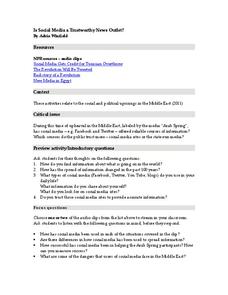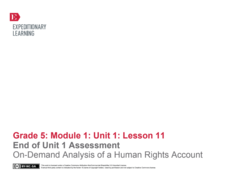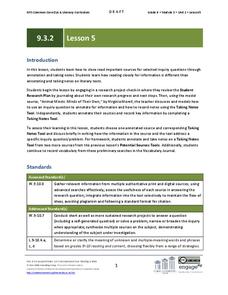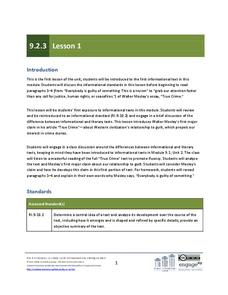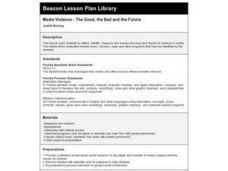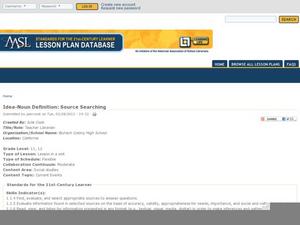Polk Bros Foundation
Contrast Points of View
Compare two positions on the same topic and assess the positions for logical argument with a basic worksheet. Pupils fill in information about each position, note down which position is more logical, and compose a few sentences...
Odell Education
Making Evidence-Based Claims: Grade 8
American women have been working toward equal rights since the ink dried on the Declaration of Independence. Focused on the words and actions of Sojourner Truth, Shirley Chisholm, and Venus Williams, a language arts lesson takes eighth...
Curated OER
Pathfinders: Using Information Resources
Eighth graders gather and use information on a chosen topic for a hypothetical research paper. They use organizational features of printed text, the Internet, and other media to locate information and choose a specific topic.
Curated OER
Who is the Expert? Exploring Credible Sources in Healthcare
How do you decide what sources are credible when researching online? Evaluate sources with a focus on researching health issues. After brainstorming common health concerns and how they would try to diagnose these problems, class members...
Curated OER
Credible Sources on the Internet: What to Trust, What to Dismiss and When to Cite a Source
Wait, you mean researchers don't all use Wikipedia? Teach your class about intelligent research with a lesson about evaluating digital sources. The lesson starts with a quickwrite and includes vocabulary exercises and several...
Curated OER
Is Social Media a Trustworthy News Outlet?
Examine the role of social media in social and political uprisings. Pupils listen to NPR audio clips about social media and the Arab Spring and read an article that proposes the idea that revolution will not happen through social media....
PBS
How to Teach Your Students about Fake News
What media literacy skills do people need to evaluate a news source? Scholars listen to and discuss an NPR story about how fake headlines often dupe young people and adults alike. Next, they study news stories, using a fact-checking...
EngageNY
End of Unit 1 Assessment: On-Demand Analysis of a Human Rights Account
The last instructional activity in this unit about human rights consists of a final assessment. To demonstrate the skills your class has acquired throughout this unit, they will work with a new article entitled "From Kosovo to the United...
Curated OER
I Need More Information!
Students research a topic of their choice. In this researching lesson, students gather information and take notes about a topic they feel strongly about.
Polk Bros Foundation
Common Core Constructed Response Organizer
Get your writers ready to compose a constructed response essay in response to either an informational or fictional text. Pupils note down the big idea they wish to address as well as up to nine examples from the text that they wish to...
K20 LEARN
The K20 Chronicle, Lesson 1: What Makes a Good Article?
Good news articles are engaging, informative, and often compelling. In the first instructional activity of the four-part series, young journalists analyze and evaluate news stories about former NBA player Enes Kanter Freedom. They learn...
EngageNY
Grade 9 ELA Module 3, Unit 2, Lesson 5
Once you find and evaluate your sources, it's time to discern the most helpful information. In a research lesson plan based on questions derived from Temple Grandin's Animals in Translation, practice annotation and taking notes.
Curated OER
Unit 3: Scientific Writing
Write-on! Demonstrate a writing model and support learners as they write an informational essay on a water resource issue of your (or their) choosing. The lesson plan provides a well-scaffolded summative writing experience that wraps up...
EngageNY
Individual Research
Seventh graders get the option of choosing their own text from a selection to read and gather more information as part of their research. Learners discuss the difference in reading for research and reading for pleasure. They also begin...
BW Walch
Vending Machine Bans Increase in Schools Nationwide
Does a ban on vending machines infringe on student rights, or do school officials have an obligation to monitor foods sold on school grounds? Your class members will explore the educational, health, and financial issues related to...
EngageNY
Grade 9 ELA Module 2, Unit 3, Lesson 1
"True-crime stories, murder mysteries, up-to-the-minute online news reports, and (as always) rumor and innuendo grab our attention faster than any call for justice, human rights, or ceasefires." Or so says Walter Mosley in his Newsweek...
EngageNY
Analyzing the Power of Different Mediums: A Mighty Long Way
Weigh the pros and cons. Class members continue sharing their thoughts on media and events by watching the video John Chancellor Reports on the Integration at Central High School. They discuss the advantages and disadvantages of gaining...
Curated OER
Media Violence - The Good, the Bad and the Future
Third graders define, identify, measure, and assess the level and impact of violence in media. The media forms evaluated include music, sitcoms, news, and other programs that are identified and shared by the class.
Curated OER
Crossing the Delaware with Historic, Cultural, and Personal Interpretations
Sixth graders discover the importance of information sources by researching the United States History. In this research gathering lesson, 6th graders examine a historical painting of George Washington and analyze what it means, what the...
Curated OER
Idea-Noun Definition: Source Searching
A great idea for showing language arts pupils the universality of themes, even in the real world! Have class members choose an idea-noun (peace, justice, war, love, etc.) at the beginning of the year or semester. They complete weekly...
Jen London
Building an Argument
Collect evidence and reasons and fill them in on this page to prepare for presenting an argument. Learners can evaluate what they are missing and make sure they fill in each line and bubble before considering their argument complete.
Middle Tennessee State University
The Declaration of Independence: Its Legacy and Ideas in Today’s World
How is it possible that such an old document still triggers modern discussions? Teach scholars why the Declaration of Independence is still so important today using an informative resource. They watch various educational videos, work in...
Curated OER
The People's Design Award
Young scholars analyze, critique, and evaluate information from various sources and learn about the design process. In this design lesson, students critique work submitted to People's Design Award and create a design of their own to...
Curated OER
Persuasive Elements
Investigate letters to the editor and their persuasive qualities. Break your class into reading groups and give each one a different article. As they read, they complete a graphic organizer to record their thoughts and opinions. There is...







